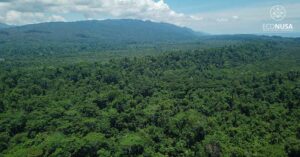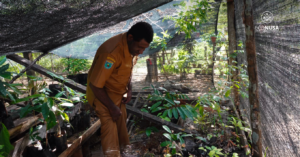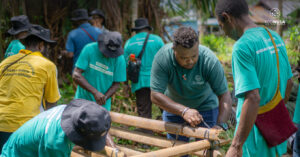
Tanah Papua has countless enigmatic sources to unveil. The rich biodiversity in Tanah Papua has challenged young scientists to find alternate solution for a sustainable development. The scientific scrutiny is expectedly to bring prosperity to the native Papuan people while preserving the natural resources.
Rieni Tumanggor, a student of Papua University’s School of Forestry, believed that red fruit (pandanus conideus lam) has far more potentials for further utilization. The endemic fruit of Tanah Papua here has various efficacies. A study found that red fruit could block cancer cell, drop malicious cholesterol, antioxidant that relieves inflammation and controlling triglyceride.
Red fruit could be directly eaten, boiled or roasted. People in Tanah Papua utilize the red fruit as the source of oil and fat. Students of Muhammadiyah University of Semarang (2018) uses the red fruit as the materials for sauce.
Assisted by Papuan Young Scientists (IMP) panelist team, Rieni searched for data on alternate utilization of red fruit for the community and the sustainability of the fruit itself. She studied the potential of red fruit as the powdered-form natural coloring substance for food.
“I want to create food coloring powder which is easily used to other kinds of food. The study aims to endorse the argument that red fruit could be processed into various kinds of traditional products of Tanah Papua,” said Rieni to EcoNusa.
Rieni said her research could help support the sustainable development in Tanah Papua. In addition to agricultural development by local food processing, Rieni expected her study could run a sustainable economy for the native Papuans.

“The residue of red fruit after oil making could be utilized into other purpose,” said Rieni.
Similarly to Rieni, Jeremy Palege, a student of Cenderawasih University’ School of Math and Science, is also curious to conduct a study due to the lack of research. Jeremy found that there is no detailed research on maleo papua bird (megapodius decollates) that has been published.

Maleo bird can be found in some places. In Sulawesi, Macrocephalon maleo has been constituted as close to extinct animal. Such a condition also happens to maleo waigeo (aepypodius brujinii). Despite the low risk, maleo papua is also vulnerable to wild hunt.
“There is no specific study yet on maleo papua. There is a glimpse mention of maleo papua, but the study took place in New Guinea. In the research, maleo papua is deemed part of species of bird. But, it lacks the detail of maleo papua,” said Jeremy.
Jeremy said the maleo papua population is susceptible to the hunt of its egg due to its high price. A maleo egg costs IDR20,000-25,000.
“Not all community in Soaib Village in Jayapura but some frequently go to the forest and bring with them maleo eggs. The egg price is high when I search for an info at Sentani market. Maleo egg is usually for consumption,” said Jeremy.
Cenderawasih University lecturer and member of IMP panelist team, Henderita Loisa Ohee, said the less studies could affect decision making for a development. For the reason, the study would be very important to keep biodiversity and also economic access of the community.
“There is only less research on walking shark in Cenderawasih Bay. The information on its population is not available. It needs study so that tourism activity may not destroy its habitat that decreases its population. Another example is about palm oil plantation that will be opened at the habitat of maleo bird. Data on maleo is important for the stakeholders to prevent palm oil development there due to the existence of the endemic bird habitat,” Henderita said.
Henderita expected that the 20 young researchers of IMP could keep their curiosity for research. As to her, university graduates from school of sciences tend to shift their profession. Despite its normalcy, but she regrets that it could decrease the number of researchers.
Actually, being a researcher in Papua or other places in Indonesia is challenging. In a certain of period, ecological researchers may not get satisfying results. “Actually shifting profession is no problem. But the decreasing number of researchers that matters. Besides, there is also less amount of budget to finance a study. There are not many researchers on biodiversity or other field of studies. I hope they become researchers and their capacity is always upgraded,” said Henderita.
Editor: V. Arnila Wulandani dan Leo Wahyudi







